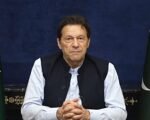Pakistan is holding its general elections today, with millions of voters expected to choose their representatives for the next five years. The main contenders are the Pakistan Muslim League-Nawaz (PML-N) of former Prime Minister Nawaz Sharif, the Pakistan Tehreek-e-Insaf (PTI) of jailed former Prime Minister Imran Khan, and the Pakistan Peoples Party (PPP) of Bilawal Bhutto-Zardari.

Imran Khan casts postal ballot from Adiala Jail
One of the most prominent figures in the election, Imran Khan, has cast his vote through a postal ballot from Adiala Jail, where he is serving multiple sentences for corruption, espionage and un-Islamic marriage. According to sources cited by Dawn, Khan voted on Wednesday, a day before the polling day. However, his wife Bushra Bibi was not able to vote as she was arrested after the completion of the postal voting process.
Imran Khan, who led the PTI to victory in the 2018 elections, was ousted from power in 2020 after the Supreme Court disqualified him for concealing his assets and income. He was also convicted in several cases, including the Toshakhana case, the Dawn leaks case and the Bushra Bibi case. He has been in jail since then, despite his appeals and protests by his supporters.
Khan released a pre-recorded message on Wednesday, urging his supporters to come out and vote in large numbers. He said that only through elections, they could change the future of themselves and their children. He also claimed that he was innocent and a victim of political vendetta.
PML-N leads in pre-poll surveys
The PML-N, led by Nawaz Sharif’s brother Shehbaz Sharif, is considered the front-runner in the election, according to various pre-poll surveys. The party has been campaigning on the slogan of “Vote ko izzat do” (Respect the vote), accusing the establishment of meddling in the electoral process and undermining the civilian supremacy. The party has also promised to revive the economy, improve the health and education sectors, and restore the relations with India and other countries.
The PML-N has fielded candidates in all the 272 constituencies of the National Assembly, the lower house of the parliament. The party has also formed alliances with several smaller parties, such as the Jamiat Ulema-e-Islam-Fazl (JUI-F), the Pakistan Muslim League-Functional (PML-F) and the Awami National Party (ANP).
PPP hopes to make a comeback
The PPP, led by the son of former Prime Minister Benazir Bhutto, Bilawal Bhutto-Zardari, has been declared as the party’s prime ministerial candidate. The party has been focusing on the issues of poverty, unemployment, inflation and human rights. The party has also vowed to strengthen the democracy, federalism and the 18th amendment, which devolved more powers to the provinces.
The PPP has a strong base in the southern province of Sindh, where it is expected to win most of the seats. The party has also fielded candidates in other provinces, especially in Punjab, where it hopes to challenge the PML-N and the PTI. The party has also joined hands with some regional and ethnic parties, such as the Muttahida Qaumi Movement-Pakistan (MQM-P), the Balochistan National Party-Mengal (BNP-M) and the Grand Democratic Alliance (GDA).
Security and Covid-19 challenges
The election is being held amid tight security and Covid-19 protocols. The Election Commission of Pakistan (ECP) has deployed over 600,000 security personnel, including the army, the police and the paramilitary forces, to ensure a peaceful and fair polling. The ECP has also installed over 100,000 cameras and biometric devices at the polling stations to prevent any rigging or fraud.
The ECP has also issued guidelines for the voters and the polling staff to follow the standard operating procedures (SOPs) to prevent the spread of the coronavirus. The voters have been asked to wear masks, maintain social distancing and sanitize their hands before and after casting their votes. The polling staff have been provided with personal protective equipment (PPE) and thermal scanners. The ECP has also banned any public gatherings or rallies on the polling day.
The polling will continue till 5 pm (local time), after which the counting of votes will begin. The results are expected to be announced by late night or early morning. The ECP has said that it will ensure the transparency and credibility of the election process.








